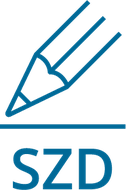Apr 13, 2022
Good question: How do I keep track of everything I read?
In the writing consultation at the TU Dresden Writing Center, many good questions are asked. To the question "How do I keep track of everything I've read?" Elisabeth, a trained writing peer tutor since 2018, gives a first answer:
Writing a scientific paper always involves reading. The more extensive the work, the more literature is necessary, and then it can happen that you sit down while writing and think: I have read something about this. But where was that again?
So that you don't have to go through all the sources again, it is good to think about the management of literature and citations before you start reading. There is software that makes life easier: literature management programs. These programs can not only automatically create a bibliography, but also facilitate the overview, among other things by assigning keywords. Some programs also allow the creation of citations, so that one does not have to look into the respective publications when searching for information, but only searches through the information written out by oneself. The link to the right document and the right place is stored by the program.
If you don't want to store your quotations in a program, you can of course help yourself in another way. The important thing is to think about how you will search for them later when you write them down, and to make them findable again. My tip is to use categories. If you already know the structure of your text, you can create categories. Otherwise you can create the categories piece by piece. For example, you can write all the information in an Excel spreadsheet. There you can write meta information like the source, page and comments in extra columns, and you can provide a column for the category (take a look at the methode 4 column reading, PDF). Even if this column should be empty at the beginning, you can always look at your collected information and find categories. Later you can filter by these categories and see all the information about a topic.
If you are a fan of analog working, you can do something similar with index cards. One of the most famous fans of the so-called card index is Niklas Luhmann. In his article Kommunikation mit Zettelkästen. Ein Erfahrungsbericht (1981), Luhmann describes how his slip box system became a universal tool and communication partner. Luhmann's slip box, which he kept for decades, became a very complex system. However, to keep track of literature for e.g. a term paper, a sheet of paper (or an Excel spreadsheet) using the 4-column reading method is sufficient.
The reason why I would always recommend at least trying out working with a literature management program is the fact that inserting citations into the body text and creating a bibliography with exactly the sources that were also cited is made much easier. How many of the other functionalities one uses is ultimately up to each person to figure out for themselves.
- If you want to know more about literature management programs, the SLUB has a good overview for you profiles of different literature management programs on the SLUB website and regularly offers introductory events to various literaur management programs
- For Citavi - a program with a very large range of functions - the TU Dresden has concluded a campus license for students and employees: Website of the ZIH for the campus license of the TUD for Citavi
- Another popular literature management program that can also be used free of charge at any time is Zotero. Simon Meier-Vieracker gives tips on how to use it in a tutorial on the YouTube channel of the Applied Linguistics at TU Dresden.
Are you unsure of how to best manage the literature you've read, or would you like further assistance with reading and citation? Then just come to our writing consultation! For more information, visit our Writing Consultation webpage.
 © privat
© privat
Studentische Hilfskraft
NameElisabeth Freund
Schreibberatung, Workshops
Send encrypted email via the SecureMail portal (for TUD external users only).
About the author: Elisabeth was a writing tutor at the Writing Center from October 2018 to March 2022. She completed her Master's degree in Cognitive-Affective Neuroscience at TU Dresden in the winter semester 2021/22 and has been a research assistant at the Faculty of Psychology since April 2022.
Literature:
Luhmann, N. (1981). Kommunikation mit Zettelkästen. In: Baier, H., Kepplinger, H.M., Reumann, K. (eds) Öffentliche Meinung und sozialer Wandel / Public Opinion and Social Change. VS Verlag für Sozialwissenschaften. S. 222–228.
This post appeared on the occasion of Writing Center Newsletter in April 2022. This and other newsletter issues are linked in the Writing Center Newsletter Archive.
 © TUD
© TUD
Writing Center of TUD
Send encrypted email via the SecureMail portal (for TUD external users only).
Visiting address:
Fritz-Foerster-Bau, room 571 Mommsenstr. 6
01069 Dresden
Postal address:
TUD Dresden University of Technology
Zentrum für Weiterbildung/Career Service
Schreibzentrum
01062 Dresden
The Writing Center of the TU Dresden (SZD) supports students and lecturers with offers for planning and writing various texts in studies such as vouchers, protocols, seminar papers and theses and for teaching academic writing in teaching and supervision. All information about offers and possibilities of support can be found in the areas for students and lecturers.
Translated with www.DeepL.com/Translator (free version)

